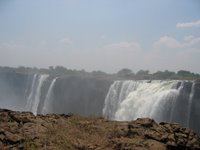November 20, 2005
Dear Friends & Family:
My time in Botswana is coming to a close soon. The past 2 weeks have been busy, with busy weeks in the hospital and weekends exploring the wildlife and landscapes of Botswana and nearby.
Work at the hospital continues to be intense, with many sick patients, deaths of some of our patients (many younger than us—young doctors in our 20s and 30s hate to see patients die younger than us—but then doesn’t everyone?), but also with some nice saves. One woman I had feared would just get worse sat up on Tuesday and said, “I’m going home.” Only then did I appreciate how much better she was—from “death’s door” as it were—and we sent her home the next day. The wards demonstrate a phenomenon gone from American hospitals with their single and double rooms—patients helping each other. We had a 13 year old girl for 2 weeks, and she and the older women around her formed very sweet relationships, helping to get water, and just encouraging each others’ recovery.
I have been amusing my patients with Setswana, a little more each week. While a very kind young Motswana tutored me before my departure, I have struggled with how much to try to communicate in Setswana (the first language of most of my patients), or English (the official language of the country, which is familiar to most Batswana under 30, but quite variable in those who are older because schools were not universally available before the 1970s). I can say hello (dumela), please (ke kopa gore), thank you (ke a leboga), and basic greetings, and I have some medical vocabulary (madi for blood, mathata for problem, botlhoko for pain), but with only a few lessons and perhaps 20 hours to study, once I ask the question, what will I do with the answer? I think the main purpose of my attempts at Setswana is to express my respect for Botswana’s people and culture, and to offer an opening for them to share the ultimately personal and frightening symptoms that have brought them to medical care.
Last weekend I went with one of the others to Chobe National Park and Victoria Falls at the border of Zambia and Zimbabwe. Vic Falls is beautiful, but sad to see. The mighty Zambezie river which rushes over the rocks in Zambia to land in the gorge below is very dry, with a few small falls where a massive 1.7 km wall of water is meant to be. It is beautiful nonetheless, but one feels for the people and animals dependent on all that missing water.
The Chobe river in northern Botswana serves massive herds of elephants, hippos, antelope, and buffalo, and we got to see them in their natural glory.
This weekend I went to the edge of the Okavango Delta, where three of us stayed with a lovely Zimbabwean family who have worked in tourism all over Africa. They were extraordinary guides, and shared with us their local contingents of hippos, elephants, zebras, lions, giraffes, and a leopard with her little cub. Just breathtaking—you’ll have to see the pictures.
In a few days I return home. I have learned so many of the timeless lessons we all learn from travel. What is special about home, what is peculiar about home, and a tiny little bit about what it might be like to live another’s life…more on all this later.
Peace,
Carla
Subscribe to:
Post Comments (Atom)


No comments:
Post a Comment